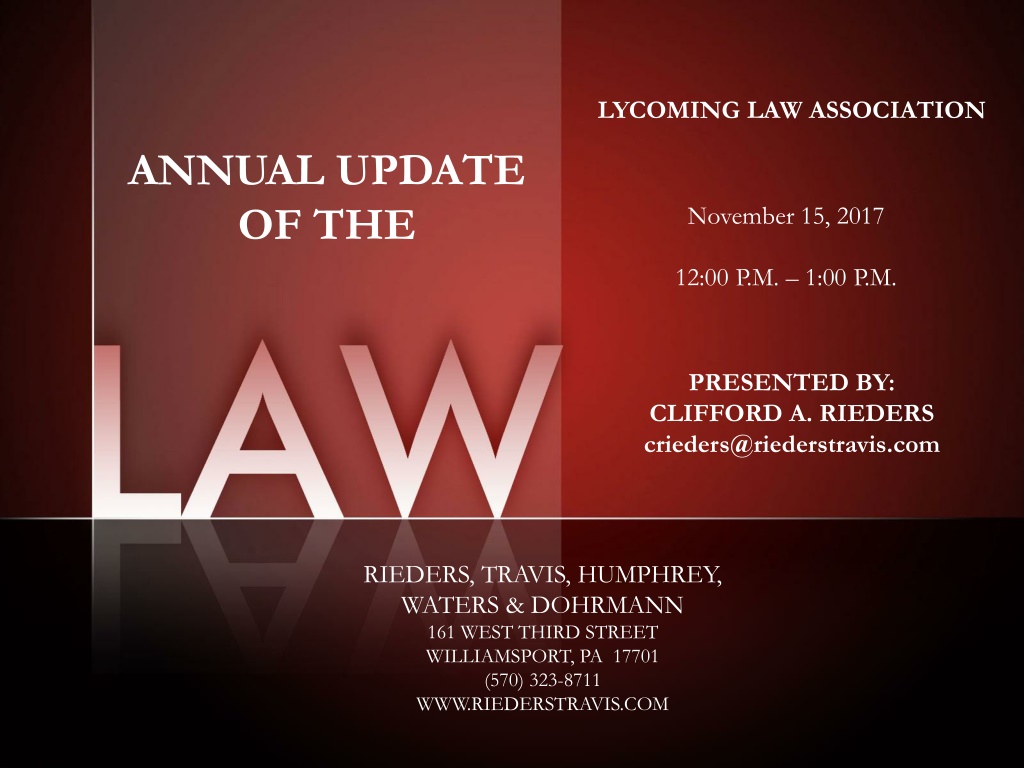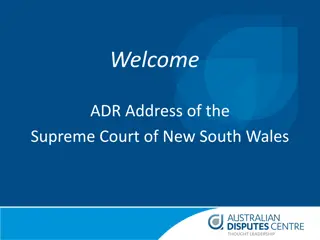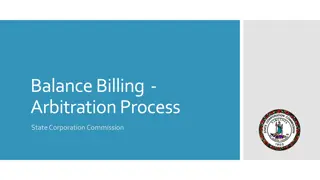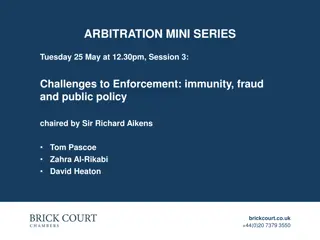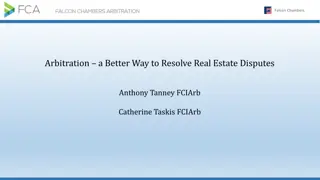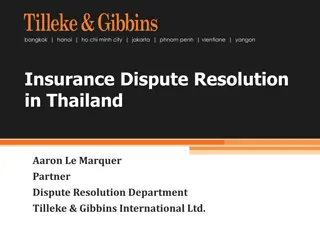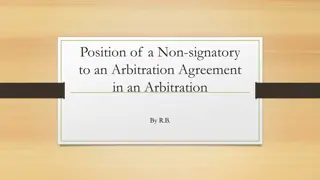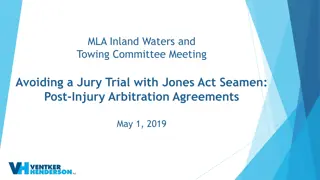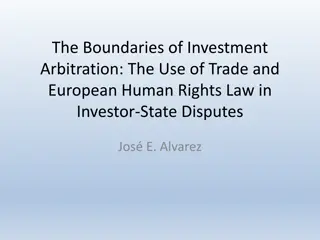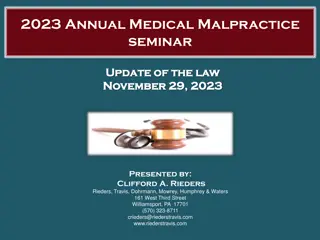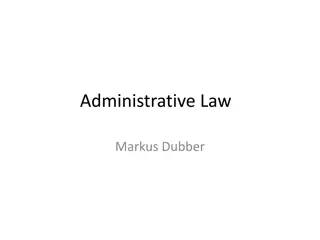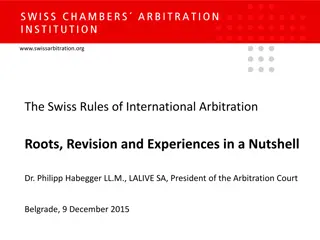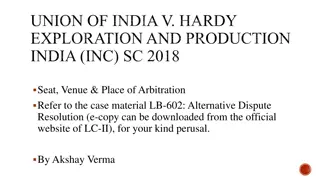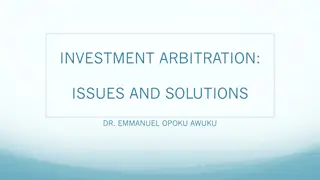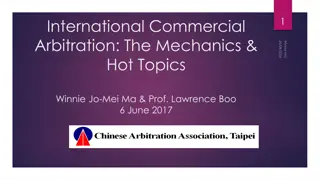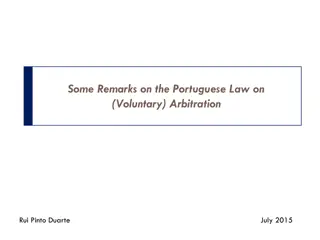Legal Updates on Arbitration Cases
This legal update covers recent arbitration cases including Directv, Inc. v. Imburgia, Kindred Nursing Ctrs. v. Clark, and Taylor v. Extendicare Health Facilities. The cases discuss the enforceability of arbitration agreements, the scope of power of attorneys in entering into arbitration agreements, and the preemption of state laws by the Federal Arbitration Act.
Download Presentation

Please find below an Image/Link to download the presentation.
The content on the website is provided AS IS for your information and personal use only. It may not be sold, licensed, or shared on other websites without obtaining consent from the author.If you encounter any issues during the download, it is possible that the publisher has removed the file from their server.
You are allowed to download the files provided on this website for personal or commercial use, subject to the condition that they are used lawfully. All files are the property of their respective owners.
The content on the website is provided AS IS for your information and personal use only. It may not be sold, licensed, or shared on other websites without obtaining consent from the author.
E N D
Presentation Transcript
LYCOMING LAW ASSOCIATION ANNUAL UPDATE OF THE November 15, 2017 12:00 P.M. 1:00 P.M. PRESENTED BY: CLIFFORD A. RIEDERS crieders@riederstravis.com RIEDERS, TRAVIS, HUMPHREY, WATERS & DOHRMANN 161 WEST THIRD STREET WILLIAMSPORT, PA 17701 (570) 323-8711 WWW.RIEDERSTRAVIS.COM
ARBITRATION NON-PERSONAL INJURY 2
DIRECTV, Inc. v. Imburgia 136 S.Ct. 463 (2015) Breyer, J. FAA states that a written provision in a contract providing for settle[ment] by arbitration of a controversy arising out of that contract...shall be valid, irrevocable, and enforceable, save upon such grounds as exist at law or in equity for the revocation of any contract. ... California refused to enforce an arbitration provision in a contract. In our view, that decision does not rest upon such grounds as exist...for the revocation of any contract, and we consequently set that judgment aside. Judgment was reversed and the case remanded for further proceedings. 3
ARBITRATION NURSING HOME 4
Kindred Nursing Ctrs. Pship, et al. v. Clark 2017 U.S. LEXIS 2948 (May 15, 2017) Kagan, J. Respondent-Plaintiff filed suit for substandard care by Petitioner-Defendant causing the deaths of two family members whom they were POA s for. Upon entering Kindred Nursing Centers, Respondent-Plaintiff signed arbitration agreements on the relative s behalf stating any claims would be resolved through binding arbitration. Petitioner-Defendant moved to dismiss claim stating the arbitration agreements prohibited disputes in court. Trial court denied Petitioner-Defendant s motion and the suit went forward. 5
Kindred Nursing Ctrs. Pship, et al. v. Clark 2017 U.S. LEXIS 2948 (May 15, 2017) Kagan, J. Kentucky Supreme Court held that a general grant of POA does not permit a legal representative to enter into an arbitration agreement for someone else. Supreme Court held that the court s clear-statement rule violates the Federal Arbitration Act by singling out arbitration agreement for disfavored treatment. Blew aside 7th Amendment. Found FAA preempted state law and 7th Amendment. 6
Taylor v. Extendicare Health Facilities 147 A.3d 490 (Pa. 2016) Wecht, J. Defendant executed an arbitration agreement was decedent requiring the arbitration of claims arising from decedent s care at the facility. Plaintiffs brought claim on behalf of themselves as wrongful death beneficiaries. Trial court relied upon Rule 213(e) to deny defendant s motion to bifurcate and Supreme Court affirmed. It was concluded that FAA preempts Rule 213(e) requiring arbitration. State s only exception in enforcing an arbitration agreement is provided by the savings clause permitting the application of generally applicable state contract law defenses. 7
Taylor v. Extendicare Health Facilities 147 A.3d 490 (Pa. 2016) Wecht, J. Rule 213(e) does not fall within the savings clause Declining to bifurcate the actions taken against Defendant would nullify the ADR Agreement. Trial Court held the parties will have the opportunity to litigate whether there is a valid and enforceable contract in accord with generally applicable contract defenses and the FAA s savings clause. 8
Wert v. Manor Care Carlisle, PA, LLC 124 A.3d 1248 (Pa. 2015) Saylor, C.J. This case involved mandatory arbitration of a nursing home dispute. Previous ruling shows that NAF Designation voided an identical arbitration agreement. Post consent decree, Section 5 of the FAA, cannot preserve NAF- incorporated arbitration agreements unless the parties made the NAF s availability nonessential. NAF must administer its code unless the parties agree to the contrary. Underlying FAA policy, as interpreted by the Supreme Court in Marmet, does not mandate a different result because our conclusion is based on settled PA contract law principles that stand independent of arbitration. 9
Washburn v. Northern Health Facilities 121 A.3d 1008 (Pa. Super. 2015) Bowes, J. Mrs. Washburn, having no POA for her husband, signed a stand- alone ADR between her husband and the nursing home. Mr. Washburn did not sign the ADR. No facts to show Mr. Washburn authorized her to sign. Issue: whether a valid agreement to arbitrate existed. Equitable estoppel does not assist the nursing home. No evidence or merit to the argument that Mr. Washburn was an intended third-party beneficiary of the arbitration agreement signed by his wife. Appealed from an order overruling preliminary objections in the nature of a petition to compel arbitration. The Superior Court affirmed. 10
Wisler v. Manor Care of Lancaster, PA, LLC 124 A.3d 317 (Pa. Super. 2015) Stabile, J. Manor Care contends that the trial court erred in refusing to compel arbitration of executor s claims arising out of Decedent's stay at a Manor Care Nursing Home. Trial Court found the arbitration agreement invalid. The POA for Decedent lacked the authority to enter into such agreement. Express authority exists where the principal deliberately and specifically grants authority to the agent as to certain matters. That did not happen. Decision should encourage parties seeking an agreement to arbitrate to ascertain the source of an agent s authority before allowing the agent to sign and arbitration agreement on a principal s behalf. 11
Tuomi v. Extendicare, Inc. 119 A.3d 1030 (Pa. Super. 2015) Bowes, J. Decedent s husband brought negligence actions for wrongful death, and survival actions premised on negligence and negligence per se against assisted living facility and nursing home. A Voluntary Arbitration Agreement had been signed by the Administrator upon the patient s admission to Extendicare. PA Rule of Procedure 213(e) requires the consolidation of wrongful death and survival actions and the lower court concluded the actions would remain together in court. There were multiple defendants, one of whom did not have a predispute arbitration clause signed by the Administrator. Administrator alleged both contributed to the injuries and death of decedent. Superior Court held that FAA did not preempt state law mandating consolidation of wrongful death and survival actions, and was not required to bifurcate action to compel arbitration of survival claim. 12
Bair v. Manor Care of Elizabethtown, PA 108 A.3d 94 (Pa. Super. 2015) Bowes, J. Plaintiff filed a wrongful death and survival action claiming that Manor Care was neglectful and abused her mother during her stay in the facility which ultimately caused her death. Manor Care sought to have the case referred to arbitration. The court permitted discovery and an interlocutory appeal followed. Burden is on Manor Care to demonstrate that a valid agreement to arbitrate existed between the parties and that the dispute was within the scope of the agreement. Trial Court determined that there was no agreement to arbitrate because Manor Care failed to affix its signature for consent. 13
NURSING HOME NEGLIGENCE - SOL 14
Dubose v. Quinlan 125 A.3d 1231 (Pa. Super. 2015) Ford Elliot, P.J.E. Mrs. Dubose, suffering from severe brain damage, developed a pressure wound while in a nursing home and ultimately passed away. Nursing home used a licensed practical nurse to provide advanced wound care, in violation of the Nurse Practices Act, for Mrs. Dubose s 10 pressure ulcers and systemic infection. Evidence showed that decedent was malnourished, dehydrated and suffered conscious pain from numerous bed sores. Mcare Act provides that wrongful death and survival actions may be brought within two (2) years from the date of death. Argument was made that the SOL began to run when Mrs. Dubose developed a pressure wound. The Court clearly rejected that. 15
Dubose v. Quinlan 125 A.3d 1231 (Pa. Super. 2015) Ford Elliot, P.J.E. Defendant argued wrongful death actions are strictly limited to pecuniary damages. The Court rejected that. Rejected was the claim that wrongful death does not encompass damages for emotional loss or mental pain and suffering. Evidence was sufficient to prove punitive damages. Wrongful death verdict was $125,000, and the Survival Act verdict was $1 million. Fact that Mrs. Dubose suffered permanent, debilitating brain injury does not mean that she was physiologically incapable of feeling pain. Verdict should not be discounted because of decreased mental functioning and poor prognosis. Nursing home cannot show that it was prejudiced by the jury s punitive damage award since it was less than the compensatory damages. There was no requirement to bifurcate the punitive damage phase of the trial. 16
NEGLIGENCE NON-PERSONAL INJURY 17
Gongloff Contracting v. L. Robert Kimball 119 A.3d 1070 (Pa. Super. 2015) Shogan, J. Steel subcontractor brought action against architect for negligent misrepresentation, alleging it incurred numerous problems on construction project due to improper roof design. Architect filed joinder complaint to join general contractor, steel contractor and professional engineer. Architect filed motion for judgment on the pleadings based on the SOL and the economic loss doctrine. PA law bars claims brought in negligence that result solely in economic loss, but that limitation does not apply to 552 of the Restatement (Second) of torts. 18
Gongloff Contracting v. L. Robert Kimball 119 A.3d 1070 (Pa. Super. 2015) Shogan, J. Gongloff alleged that Kimball was working on the project in order to provide guidance. Feasibility of construction of the roof in accordance with Kimball s design was called into question. Not enough under 552 of the Restatement (Second) of torts. Section 552 states: 1. A misrepresentation of a material fact; 2. Made under circumstances in which that misrepresenter ought to have known its falsity; 3. With an intent to induce another to act on it; and 4. Which results in injury to a party acting in justifiable reliance on the misrepresentation. 19
NEGLIGENCE RELEASE 20
McDonald v. Whitewater Challengers, Inc. 116 A.3d 99 (Pa. Super. 2015) Fitzgerald, J. Rafting trip participant, a teacher who was chaperoning students on rafting trip, brought negligence action against rafting trip operator, alleging injury from participant s raft striking a rock. Participant signed an exculpatory release with Defendant. The activity is considered an inherently dangerous sports activity and there is no public policy against a release in these circumstances. Exculpatory clause addressing negligence does not contravene PA s public policy. 21
NEGLIGENCE DRAM SHOP ACT 22
Juszczyszyn v. Taiwo 113 A.2d 853 (Pa. Super. 2015) Shogan, J. Police officer filed complaint against bar owners, alleging negligence and liability under the Dram Shop Act. Duty of the possessor of the land is to use reasonable care to protect his or her invitees from unknown or non-obvious dangers. In this case the police officer was responding to a disturbance at the bar and encountered an intoxicated person and physically confronted that person creating a known risk. Court concluded that the police officer was not within the class of individuals that the Dram Shop Act was designed to protect. 23
NEGLIGENCE ELECTRICAL LINES 24
Greely v. West Penn Power Co. 2017 Pa. Super. LEXIS 86 (Feb. 13, 2017) Stabile, J. Plaintiff was installing telecommunications cables across a line of utility poles owned by defendant when cable bounced and created an electrical arc electrocuting plaintiff. Suit filed claiming defendant failed to de-energize power lines, failed to ensure cables were sufficient distance from power lines, providing adequate space on poles and to take safe measures providing a safe workplace for Plaintiff. Trial Court concluded plaintiff s own conduct caused cable to bounce close to electrical line. Appeal filed challenging grant of summary judgment for Defendant. Court reversed and remanded stating trial court erred in its determination concerning duty of care owed by failing to view evidence in light most favorable to Appellant. 25
NEGLIGENCE VALET 26
Moranko v. Downs Racing LP 118 A.3d 1111 (Pa. Super. 2015) Panella, J. Administratrix of driver s estate brought wrongful death and survival action against casino, alleging casino s valet parking service was negligent in returning car to visibly intoxicated driver who was later involved in a car accident and died. Court held that the casino s valet parking service did not have a duty to withhold driver s vehicle. Under PA law, a mutual bailment is created where a valet service accepts possession of a patron s keys and parks the vehicle as a service to those gambling on the casino premises and the vehicle must be returned. 27
NEGLIGENCE FALL DOWN 28
Reinoso v. Heritage Warminster SPE LLC 108 A.3d 80 (Pa. Super. 2015) Stabile, J. Sixty year old woman and five year old grandaughter tripped and fell on a raised section of sidewalk at the Warminster Towne Center. Difference in sidewalk height was 5/8th of an inch in the middle of the walk where the Plaintiffs in question were walking. Surrounding circumstances not only included a height difference between the sidewalk panels but also a recognized heightened duty to an individual as an invitee. Expert testimony indicated height differential exceeded safety standards and testimony from owner of the company charged with maintenance of the sidewalk that he considered the defect a tripping hazard and reported it to the landowner as such. 29
Stephens v. Clash 796 F.3d 281 (3rd Cir. 2015) Smith, C.J. Sixteen year old victim of illegal sexual activity brought action against an adult for injuries resulting from adult s violation of federal and state laws regarding sex with a minor. Victim was aware for more then two years of the infliction of the injury and the person who did it. Victim did not bring suit until after the 6 year SOL had expired and more then 3 years after the victim became an adult. Appeal was taken from dismissal of sexual battery claim. Discovery rule tolled the SOL for federal claims and PA s longer SOL for childhood sexual abuse should have applied to the sexual battery claim. Structure and text of 2255 supports recognition of the discovery rule for the claims under Pennsylvania statute for child exploitation. 30
MEDICAL MALPRACTICE DISCOVERY 31
Lattacker v. Magee Womens Hosp. PICS Case No. 16-0891 (C.P. Allegheny July 5, 2016) Wettick, J. Failure to timely perform a C-section resulting in neurological and developmental injuries to minor. Defendant indicated under questioning that he could indicate a point on a fetal heart tracing where his decision was influenced during treatment. Defendant s counsel refused to allow him to answer any further questions citing McLane v. Valley Medical Facilities. Defendant s misunderstanding of McLane led them to believe that treating physician was excused from looking at fetal heart tracing after stating he was not offering expert testimony at trial. 32
Lattacker v. Magee Womens Hosp. PICS Case No. 16-0891 (C.P. Allegheny July 5, 2016) Wettick, J. McLane holds that the use of such aids for the purpose of discovery is allowed. A treating physician would be required to provide any facts, conclusions, and opinions that are based on information gained as a treating physician. But the physician who will not be offering testimony justifying the care that she provided did not have to opine on quality of treatment and care. 33
Karim v. Reedy, MD No. 11 CV 4598 (C.P. Lackawanna January 11, 2016) Nealon, J. Malpractice action asserting obstetrical and nursing negligence in the management of plaintiff s labor and delivery that resulted in hypoxic brain damage to her child. Plaintiff seeks to compel the Defendant-Obstetrician and the Defendant-Hospital s labor and delivery nurse to answer certain questions that their counsel instructed them not to answer during depositions. Under PA Rules of Civil Procedure and the controlling decisional precedent, malpractice plaintiffs may discover the past and present opinions of a defendant and defendant s agent concerning the health care treatment at issue. 34
Karim v. Reedy, MD No. 11 CV 4598 (C.P. Lackawanna January 11, 2016) Nealon, J. No PA appellate statue, rule or appellate authority grants a party the right to withhold from discovery that party s relevant opinions, nor does it provide a malpractice defendant with the ability to prevent the discovery of those opinions, including opinions addressing the standard of care, by agreeing not to disclose those opinions at trial. OB and nurse will be directed to submit to second depositions to answer the questions that their counsel instructed them not to answer. 35
Venosh v. Henzes 321 A.3d 1026 (Pa. Super. 2015) Bowes, J. Blue Cross appealed from a discovery order requiring Blue Cross to produce information concerning the quality-of-care review. Blue Cross was deciding whether to keep Dr. Henzes and Ms. Anderson as contract health care service providers. None of these purposes were present in it s quality-of-care review A corporation that provides health care insurance and not medical care is not a professional health care provider. Trial Court rejected Blue Cross s invocation of the privilege established by the PA Peer Review Protection Act. The Superior Court affirmed. 36
Yocabet v. UPMC Presbyterian 119 A.3d 1012 (Pa. Super. 2015) Bowes, J. Transplant donor and recipient filed actions against hospital and physicians, alleging medical malpractice after transplanting a Hep. C infected kidney. Hospital was required to produce materials it asserted were confidential under Peer Review Protection Act and attorney- client privilege. Confidentiality provisions of the Peer Review Act do not apply to the CMS/DOH investigation. The DOH is not a professional health care provider and did not conduct peer review. UPMC s assertion that a record or document automatically is covered by the peer review privilege because it was forwarded to a peer review committee, was rejected. 37
Yocabet v. UPMC Presbyterian 119 A.3d 1012 (Pa. Super. 2015) Bowes, J. Argument that a corporate entity can obtain legal advice only when one of it s high-ranking officials meets privately with counsel for advice on behalf of the corporation was rejected as well. Party invoking a privilege must initially set forth facts showing that the privilege has been properly invoked before the burden shifts to the party asking for discovery to set forth facts showing that the disclosure will not violate the attorney- client privilege. 38
MEDICAL MALPRACTICE INFORMED CONSENT 39
Shinal v. Toms 2017 Pa. LEXIS 1385 (Pa. June 20, 2017) Wecht, J. Plaintiff alleges that defendant failed to obtain informed consent for an open craniotomy total resection of a brain tumor. Plaintiff s moved to strike all potential jurors who were either employed or insured by Geisinger. Court granted in part and denied in part directing that prospective jurors who were employed by named defendant, or who had family in the same house that were employed, would be stricken for cause. Indirect employment relationship with employer that has ownership interest in defendant, standing alone, does not warrant presumption of prejudice. Plaintiff invoked Cordes v. Assocs. Of Internal Med., 2014 Pa. Super. 52, 87 A.3d 829, 843-45 moving for disqualification for cause of any juror employed by any Geisinger entity. Trial court denied motion. 40
Shinal v. Toms 2017 Pa. LEXIS 1385 (Pa. June 20, 2017) Wecht, J. Court granted motion for partial summary judgment in favor of Geisinger stating the duty to obtain plaintiff s informed consent belonged solely to Dr. Toms and not his physician s assistant. Without direct dialogue and two-way exchange between physician and patient, physician cannot be confident that patient comprehends the risks, benefits, likelihood of success and alternatives. Court held that a physician may not delegate to others his or her obligation to provide sufficient information in order to obtain patient s informed consent. Superior Court s order affirmed trial court s denial of Plaintiff s motion for post-trial relief remanding for new trial. 41
Mitchell v. Shikora 2017 Pa. Super. 134 (May 5, 2017) Musmanno, J. Plaintiff suffered bowel perforation during hysterectomy. Jury returned a verdict in favor of defendant. Plaintiff filed Motion for Post Trial Relief for new trial excluding the risk/complications evidence. Motion was denied. Plaintiff appealed claiming trial court erred allowing defendants to admit evidence of known risks and complications of a surgical procedure in a case that did not involve informed consent-related claims. 42
Mitchell v. Shikora 2017 Pa. Super. 134 (May 5, 2017) Musmanno, J. Evidence must be probative of whether defendants treatment of plaintiff fell below standard of care. Fact that risk and complication of laparoscopic hysterectomy, i.e., perforation of bowel, was the injury suffered, does not make it more or less probable that defendant conformed to proper standard of care and was negligent. Judgment was reversed and a new trial without admission of risks/complications evidence is required. 43
Crew v. Penn Presbyterian Med. Ctr. 2017 Phila. Ct. Com. Pl. LEXIS 188 (June 30, 2017) Lachman, J. Decedent was admitted to Park Pleasant Health Care Facility for nursing care and therapy. With skin intact, she developed gastric and pressure ulcers. She was released in fair condition. Decedent passed away in Penn Hospice care a month later due to lack of nutrition and hydration. Jury found that Penn Hospice was not negligent and did not answer causation or damage questions on verdict slip. Plaintiff filed a post-trial motion contending that it was error to permit defendants to introduce the Consent for Hospice Care form signed by Plaintiff authorizing admission to Penn Hospice. 44
Crew v. Penn Presbyterian Med. Ctr. 2017 Phila. Ct. Com. Pl. LEXIS 188 (June 30, 2017) Lachman, J. Plaintiff argued this was an informed consent form which is barred in non-informed-consent cases by Brady v. Urbas, 631 Pa. 329, 111 A.3d 1155 (2015). The Consent to Hospice Care form has no relation to informed consent since it does not identify the risks of a proposed surgical procedure. The care was only palliative in nature. Plaintiff s attorney opened the door to the introduction of the Consent to Hospice Care form by saying in his opening statement that Ms. Crew s family wanted their mother to live. That was their intention. They were not taking her to Penn to pass away. There was no error. No error in allowing hospice opportunity to cross-examine decedent s expert regarding all opinions expressed in expert report for impeachment purposes including liability of settlement of nursing home defendants. 45
Brady v. Urbas 111 A.3d 1155 (Pa. 2015) Saylor, C.J. Negligence count against podiatrist who performed surgeries on patient's toe which failed to resolve her medical problem. The Court entered judgment on jury verdict finding that podiatrist was not negligent and denied patient's post-trial motions. Patient and her husband appealed. The Superior Court vacated, reversed, and remanded, and podiatrist appealed. The Supreme Court affirmed and held that evidence that a patient affirmatively consented to treatment after being informed of the risks of that treatment is generally irrelevant to a cause of action sounding in medical negligence. 46
Brady v. Urbas 111 A.3d 1155 (Pa. 2015) Saylor, C.J. Evidence that a patient affirmatively consented to treatment after being informed of the risks of that treatment is generally irrelevant to a cause of action sounding in medical negligence. Where a malpractice complaint only asserts negligence, and not lack of informed consent, evidence that a patient agreed to go forward with the operation, in spite of the risks of which she was informed, is irrelevant and should be excluded. Evidence about the risks of surgical procedures, in the form of either testimony or a list of such risks as they appear on an informed-consent sheet, may be relevant in establishing the standard of care in malpractice action. Fact that a patient may have agreed to a procedure in light of the known risks does not make it more or less probable that the physician was negligent in either considering the patient an appropriate candidate for the operation or in performing it in the post-consent timeframe. 47
MEDICAL MALPRACTICE CHILD ABUSE 48
K.H. ex rel. H.S. v. Kumar 122 A.3d 1080 (Pa. Super. 2015) Wecht, J. Child and parents brought negligence action against physicians and health care providers, alleging that they collectively failed to recognize, treat and report child abuse that resulted in permanent injury. Issue: Whether the lack of an express statutory civil remedy under the Child Protective Services Law, 23 Pa. C.S. 6301, et seq., implicitly precludes a common-law remedy in tort for harm sustained due to child abuse when the physician has failed to report reasonable suspicions that a child is a victim of abuse to the government authorities designated by the CPSL. Parents have a prima facie case of medical malpractice. Issue of material fact regarding whether the doctors breached the governing standard of care. Trial Court erred in entering summary judgment. 49
MEDICAL MALPRACTICE EXPERTS 50
